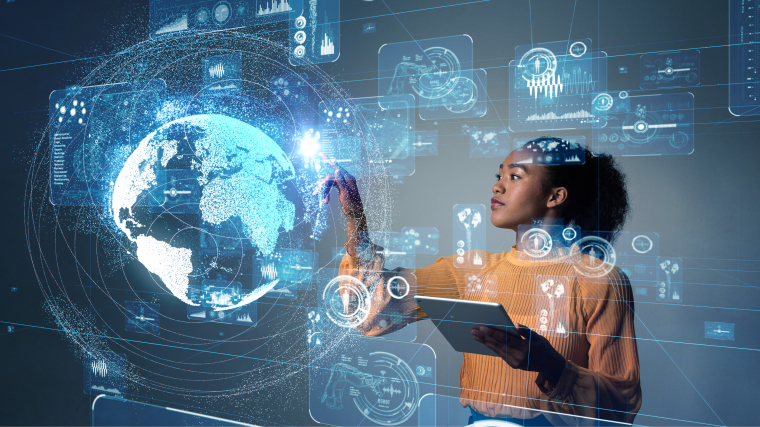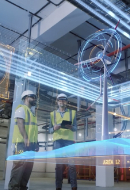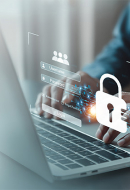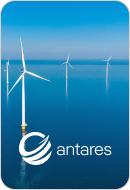Digital transformation
Introducing our Digital Plan to boost business strategy through digitalisation
Digitalisation has become a key ally for companies to seize opportunities and overcome challenges in a rapidly evolving context, and to do so with agility, security, efficiency and a people-centric approach. Digitalisation is at the heart of all business processes, accelerating them and bringing value and new opportunities.

At Iberdrola, digitalisation and innovation have been an essential part of our business for decades, and the use of information technologies has become a fundamental asset for the company.
Digitalisation to boost our strategic objectives
Our Strategic Plan 2025-2028 includes investments of €58 billion to accelerate electrification across different sectors, focusing on the expansion of electricity networks and the increase of renewable capacity while offering new value-added solutions.
Energy transition’s goals are clear and deadlines are very strict. This is why now that we are at an accelerating pace, digitalisation is, more than ever, key to ensure this effective and on-time transition.
Iberdrola's Digital Plan affects all of our business areas, accelerating their digital transformation. A transversal effort to drive the Group's strategy and promote a digital culture, while providing tools, skills and solutions that create value for all our stakeholders.
To make this transition happen, Iberdrola is committed to:
- The decentralised governance model for information technology (IT). By creating our centres of excellence, we drive business strategy from within through digitisation, using cross-disciplines to maximise the full power of knowledge and the use and deployment of best practices.
- A comprehensive cyber security strategy that focuses on integrating cyber security into business operations and decision-making, with a focus on protecting information and our platforms, early incident detection and resilience.
- The transition to the cloud. Through a plan to migrate our business platforms and applications to cloud environments, to gain flexibility, speed, availability, agility and global coverage.
- An AI growth plan. We introduce efficient improvements using the latest capabilities provided by generative AI, guaranteeing respect for people, security, transparency and explainability through our Policy for the development and responsible use of AI tools, aligned with the new European regulation, IA Act. The use of generative AI will allow us to immediately improve our dealings with customers, offering a better service in terms of quality and speed, and enriching and personalising the user experience.
In 2024, €290 million was allocated to digital projects in the businesses with a focus on growth and efficiency.
Need for decarbonisation
- Renewable energies’ growth
- Smart grids of the future
- Smart Solutions
Operational excellence
- E2E asset management and supply chain excellence
- Remote and smart operations
- Process efficiency
People
- Digital culture
- Putting customers at the centre
- Talent Care
- Personal Productivity
- Democratisation of data

"In the same way that we were pioneers decades ago in the commitment to renewable energies, we have also been pioneers in the digitalisation of electricity grids and now we are pioneers in the use of artificial intelligence and big data."
Ignacio Galán
Iberdrola's Executive Chairman
The digital impact on our value chain
At Iberdrola, we understand digitalisation as an enabler that directly contributes to the response we give to changes in our environment and accelerate our green growth. We see this impact directly reflected in the value chain of our businesses:


Renewables
For greater sustainable energy autonomy, we must install more renewable capacity. Digitalisation acts as an accelerator to deploy this energy transition in time.
- Smart planning for work in the field.
- Mobile digital management for field operations and logistics.
- Unified digital platform for promotion, development and construction.


Grids
Smart grids are the backbone through which green energy is transmitted. Digitisation allows us to provide the grid with sufficient capacity and flexibility to efficiently and agilely support the process of electrifying the demand and decarbonising generation.
- Digital twins for better asset management.
- Smart fieldwork planning.
- Transformation of the new supply process.


Customers
Digitalisation contributes to developing and promoting green products. In addition, we manage to make the solutions we propose to our customers more flexible, fostering their satisfaction and loyalty, and raising our service to the highest standards.
- Personalisation of customer communications.
- Real-time virtual assistant for agents.
- Artificial Intelligence for complaints management or email support.

 SEE INFOGRAPHY: The digital impact of our value chain [PDF]
SEE INFOGRAPHY: The digital impact of our value chain [PDF]
Tools to ensure digital transformation
We implement the following tools to ensure that digital transformation delivers value for sustainability, people and growth:

Technology
We use cutting-edge digital technologies to deliver innovative and valuable solutions to our businesses, employees, customers and suppliers, offering an excellent, agile and secure operation and service experience.
- Cloud acceleration
- Cybersecurity
- Focus on digital platforms
- Core modernisation
- Generative artificial intelligence


Maximising business value
A comprehensive model to prioritise our digital portfolio to ensure that solutions with the greatest impact are implemented and that investment and resources are allocated to the projects with the highest return.
- Quantifying digital value


Governance
Policies, procedures and practices that ensure effective, ethical and secure management of digitisation.
- Franchise model of digitisation
- Transformation into a data-driven company
- Artificial intelligence governance


Process efficiency
Optimising business processes by using digital technologies to improve productivity, reduce costs and increase the speed and quality of operations.
- Automation
- Robotisation
- Process mining
- Reduction of time-to-market


Disruptive innovation
Going beyond the digitisation of existing processes, looking for creative and disruptive ways to improve how organisations operate and deliver value.
- Connectivity of remote environments
- Autonomous inspection systems


Digital culture
Changing our company's mindset and practices to embrace and leverage digital technologies, fostering understanding and adoption of new ways of communicating and thinking.
- Employee-centred culture
- New ways of working
- People development and training

Awards and recognitions
The Group has received important international awards and recognition for our commitment to digital transformation. You can see here some of the most representative ones, divided by year:
-
- Iberdrola’s 2024 annual Integrated Report and sustainability information received the “Best Annual Report” award at the Content Marketing Awards 2025. This document, which highlights the Group’s key milestones in sustainability, electrification and social commitment, stood out for its consistency and transparency, supported by multimedia resources that promote effective communication.
-
- Neoenergia receives the Alta Award from UTCAL Summit 2024, which recognises initiatives that have stood out for their use of technology for the benefit of society. UTCAL Summit is one of the most important technological forums in automation, cybersecurity and artificial intelligence. The award-winning case 'Recomposição Automática da Rede (AGR)' is an important step towards technological transformation to address customer needs, as it is a centralised self-repair with intelligence capable of locating, isolating and restoring distribution networks in very short times.
- MF Talent: To the organisation for having a disruptive digital structure and standing out for its innovation projects in R&D&I, sustainability and influence in digital transformation and energy transition IBERDROLA.
- Legal Hub, Iberdrola's legal platform that digitalises the entire contract management process, has been awarded as the most innovative project of the year at the IX Premio Expansión awards.
- El Periódico de la Energía Award for Best Sustainable Mobility Initiative to Iberdrola and bp for their Iberdrola | bppulse initiative.
- Iberdrola is positioned among the 10 companies with the best reputation in Spain and its Executive Chairman, Ignacio Galán, as one of the 10 best corporate leaders in the country. This is according to Merco, the benchmark monitor, in its latest Merco Empresas y Líderes 2024 ranking, which includes 200 organisations and 100 top executives.
- Iberdrola has placed first in digital recognition, ahead of Microsoft and Telefónica in the Merco 2024 ranking. This indicator measures the volume of publications, as well as the impact generated by the company's messages shared by the company and other actors, such as influencers.
- The Ibex does not live (alone) on LinkedIn: Iberdrola is crowned on TikTok with 10 million likes. Bytedance itself, the app's parent company, has carried out a worldwide case study on Iberdrola's success on the app. A success that has made it a major Spanish benchmark for communication for industrial companies around the world for the last 4 years.
- Iberdrola's corporate website team was recognised for its commitment to innovation during the Liferay Customer Summit 2024. Liferay also thanked them for their contribution to technological dissemination and development.
- Iberdrola has been recognised as an international Top Employer 2024 for excellence for the excellence of its comprehensive people management practices and for its contribution to personal and professional development in attracting the best talent and integrating it to build the best team. We are the only company with this certification in Europe as a whole and in eight major countries: Spain, Germany, France, Italy, USA, UK, Mexico and Brazil. The certification process of the Top Employers Institute, a global benchmark authority in the evaluation of the professional environment that organisations provide their employees, involves an exhaustive and very rigorous analysis of people management practices and their impact on the organisation as a whole (strategy and results) and on the engagement, attraction and development of talent.
- We received the Financial Times Innovative Lawyers Award in the 'Innovation in Operational Transformation' category for the Iberdrola Legal Hub platform created by our Legal Innovation Centre, which digitalises the entire contract management process. These awards recognise the most disruptive projects of the leading law firms and in-house legal counsel of leading European companies.
- The Iberdrola Clientes Public Charging app has been awarded the AUVE (Association of Electric Vehicle Users) Prize for 'Best Software Development'. It is a special award, as it is voted for directly by electric vehicle users and reflects the importance of the experience created around vehicle charging from our App, a leader in charging management. Special mention also goes to our colleagues at Iberdrola | bp pulse also in the 'Best Charging Operator' category, for their ambitious expansion plan for the coming years, which will drive the mass adoption of electric mobility.
- Iberdrola wins the Product Innovation of the Year award for its Advanced Smart Assistant (ASA). The award is part of the Company Awards, a competition organised by the British publication Environmental Finance. The awards jury highlighted the importance of this innovation as a "necessary way to save energy for the planet and humanity".
- Iberdrola's Internal Audit Department was the winner of the "Transforma Category" in the first edition of the IAI 2024 (Institute of Internal Auditors of Spain) Innovation Awards. This award recognises transformative projects that have used new technologies to improve operational efficiency in auditing processes and has been awarded to us for the implementation of the DIANA (Data Intelligence Analytics for Audit) tool, which has meant a tangible improvement in Internal Audit processes, significantly improving communication and operational efficiency.
- Congratulations to SPARKY, our pilot mobile robot dog, for receiving the prestigious AEIC 2024 Achievement Award! The Association of Edison Lighting Companies (AEIC) recognises Avangrid's investment in robotics and artificial intelligence to detect and analyse substation equipment during inspections, improving grid reliability and ensuring customer safety and reliability.
- According to the ranking of the independent consumer ombudsman Citizen's Advice, ScottishPower is at the top of the UK energy majors in terms of customer service.
- Avangrid's Digital CoE (Centre of Excellence) and Customer Experience has recently been recognised for delivering substantial and positive customer outcomes, taking home the Residential CX Achievement Award from E Source, a consulting, research and data science firm focused on utilities.
- IBERDROLA ESPAÑA's Customer Service Department has been recognised by the EXCELLENCE in Customer Relationship Awards, organised by the AEERC (Spanish Association of Customer Relationship Experts). These awards are the most prestigious in the Contact Center Sector in Spain. Iberdrola won in 4 categories: Best Company of the Year 2024, Best Outbound B2C Commercial Relationship, Best Inbound Commercial Relationship, Best Strategic Project Omnichannel Technological Solution.
- i-DE has won the Customer Relationship Excellence Award for the best non-technological innovation project awarded by the Spanish Association of Customer Relationship Experts with its Fénix Project for "positioning its new supply process within the distribution sector as a benchmark in customer effort and experience".
- i-DE has won the DOK Summit 2024 award for Best Digital Business Transformation Project for the Smart Grids Academy project, the first academy with an international vocation to train professionals in smart grids and new digital skills. This project is a clear commitment to talent in smart grids as a factor of competitiveness and a lever in the energy transition.
- ScottishPower continues to accumulate awards for its Energy Insights customer app. It has just won the award for Best App at the UK eCommerce Awards. This latest award is in addition to the Gold for Best Digital Transformation at the prestigious European Customer Experience Awards and the Silver at the UK Customer Experience Awards. All of these awards are a symbol of ScottishPower's ongoing commitment to excellence in customer experience and digital innovation.
- Neoenergia's Voz do Cliente 360 project is a winner in the Artificial Intelligence category of the ABT Awards, Brazil's most important awards in the field of consumer relations and customer service. This initiative is part of the Digital Connection project and uses Generative AI and language models to analyse customer messages collected from various sources, such as surveys and complaints.
- The consultancy firm Comprend chooses 'Iberdrola.com' as the Best Corporate Website in Spain and in the Top 15 in Europe. The report highlights the Sustainability, Careers and About Us sections, which represent within the Webranking 2024-2025 one of the best practices in terms of transparency and credibility through the page. For Iberdrola this is key as a spearhead of the company's digital transformation.
- The 'InWoW: @Iberdrola New Ways of Working' project, where we are (r)evolving the way we work, has won the award for the best project in the "Workplace Transformation" category at the CIO 100 Awards Spain 2024. These awards, organised by IDC Spain, Foundry and CIO Spain, recognise the work of individuals and organisations that have contributed, in an exceptional and inspiring way, to the modernisation, digitisation and efficiency of their organisations through the use of technology, fostering innovation in order to improve and excel in business performance. In addition, the projects 'Iberdrola Digital Platforms: Driving business growth' in the 'Digital Infrastructure and Cloud' category and the 'System for the protection of birdlife in wind farms' in the 'Sustainability' category have been shortlisted as finalists.
- i-DE's "Hyperconvergence for the Advanced Distribution Management System (ADMS)" project has won a double award in the 'Digital Transformation' category and as 'Best Project of the 2024 edition' at the enerTIC Awards 2024. These awards recognise the most relevant initiatives in the promotion and application of technology and digitalisation to improve energy competitiveness and sustainability. The project consists of the deployment of a new AT/MT control system, based on a modern hyper-convergent infrastructure that will allow us to gain in efficiency, flexibility and sustainability in the Data Processing Centres that support it. In addition, this on premise infrastructure has simplified maintenance tasks, reinforced cybersecurity and increased redundancy, reduced energy consumption by 50%, facilitated the generation of test and development environments, and further strengthened our disaster recovery capacity. This recognition reflects our commitment to innovation, sustainability, the electrification of the economy, and the well-being of our customers, and is the result of the effort and dedication of all i-DE Smart Grids team members involved in the project.
- The "ANTARES - Renewable Development Accelerator" project, Renovables' platform for the efficient management of renewable development worldwide, has won in the 'Renewable Energy' category at the enerTIC Awards 2024. EnerTIC highlights those innovative technological projects, success stories and benchmark public or private initiatives that have helped to promote the use of ICTs to improve energy efficiency, as is the case of Antares.
-
- Iberdrola leads the ranking (second Spanish company and first in the energy sector) of the best companies with the greatest capacity to attract and retain talent in Spain in 2023, according to Merco Talento España 2023. We are also in the top 5 of the best human resources teams.
- Company of the Year 2023 Award at the CIO 100 Awards Spain organised by IDC and Foundry, formerly IDG Communications. This award recognises those who are working to become leaders in digitisation. Iberdrola is highlighted as an example of how organisations should organise and invest to carry out a digital transformation that supports their strategy and makes them more efficient and effective.
- As part of DISTRIBUTECH International, Avangrid's Customer Experience & Digital Centre of Excellence (CoE) received the Cultural Transformation Award. This recognition is part of the Smart Energy Consumer Collaborative 2024 Best Practice Awards, which highlight innovative ways in which electricity suppliers are improving customer experience and engagement and recognise best practices within the industry.
- Iberdrola awarded for Excellence in Sustainability and Digital Transformation of its Procurement Process. The award was presented by the German multinational SAP during the SAP Spend Connect 2023.
- i-DE (Iberdrola Group), wins the award for Best Customer Experience Strategy 2023 awarded by the Customer Experience Development Association, DEC, an international benchmark in the field of Customer Experience. i-DE has become the first energy distributor in Spain to receive this award, highlighting its unwavering commitment to improving the satisfaction and experience of its customers.
- Iberdrola chosen by PRNoticias.com as the company that best manages Internal Communication in our country in 2023. Its work has recently been recognised by the National Markets and Competition Commission for its good work in terms of customer service.
- According to the report 'IBEX 35 Panel on social networks 2023' by Epsilon Technologies, a leading strategic consultancy in digital marketing, Iberdrola is the Ibex company that connects the most on social networks, also connecting Iberdrola's great business and social project and its different audiences in the digital sphere. Iberdrola has led in 2023, for the second consecutive year, interactions on social networks among Ibex 35 companies, with a share of 34.92%.
- Iberdrola is the company in the energy sector in Spain with the best positioning in mobile: it has the best MPIx - Mobile Performance Index (83), is the best rated (NPS - Net Promoter Score) and has the highest market share (28.1%). In addition, our Public Recharging APP (related to charging points for electric vehicles) is also the best rated in the sector (NPS: 4.5).
- Forbes Innovation Award by Kyndryl 2023 in the Disruptive Technology category for the 'WALL-I Virtual Walls' project, a security system that uses vision and augmented reality (AR).
- Forbes Innovation Award by Kyndryl 2022 in the Disruptive Technology category for the 'R0V3RT' project for the implementation of an autonomous robot using AI, Edge Computing and cloud for the inspection of electrical substations.
- 2023 Top Innovator Award for Design Lewis Latimer for Avangrid, for the project "Simulation of cybersecurity events in the metaverse", which allows to simulate, in a secure virtual environment, cybersecurity incidents impacting an electrical substation.
- ScottishPower wins the 2022 UK eCommerce App of The Year, in recognition of its digital commitment to providing customers with the best possible user experience on its iOS and Android apps.
- Neoenergia was recognised in the Digital Communication category of the SMART CUSTOMER 2023 Awards, with the case 'Humanising Digital Transformation: How communication and data analysis strengthen the Customer Experience'. It is also the company with the most awards in the ten years of existence of these awards, which recognise business practices that offer the best experience to customers and employees.
- Neoenergia was also recognised in 2023 as one of the most innovative companies in the country's main innovation ranking, the Valor Inovação 2023 Award, produced by the Valor Econômico newspaper. In a historic achievement, the company ranked among the 5 most innovative companies in the electricity sector.
- Margarita Fernández de Prada, Iberdrola's Global Head of Digital Transformation, wins the 'Global Transformation Leader' award at the CIONET VOCENTO 2024 Awards.
- The ANTARES project of the Renewables Division is a finalist in the CIONET VOCENTO 2024 Awards.
- Iberdrola wins the Sustainable Innovation Award at the third edition of the Quest Global Innovation Awards. This award recognises those who, with vision and determination, are transforming industries with disruptive ideas and sustainable solutions.
-
-
We won the Forbes Innovation Award by Kyndryl 2022 in the Disruptive Technology category for “R0V3RT” project that implements an autonomous robot using AI, Edge Computing and cloud for the inspection of electrical substations.
-
ScottishPower, our Scottish subsidiary, was awarded the 2022 UK eCommerce App of The Year in recognition of its digital commitment to providing customers with the best possible user experience on its iOS and Android apps.
-

Digitisation in renewables
Digitalisation is the key to the integration of energy efficiency.

Pillars of cybersecurity at Iberdrola
Find out how we defend against cyber-attacks and our tips.

Corporate culture in the digital era
Digital transformation is the key to business competitiveness.








